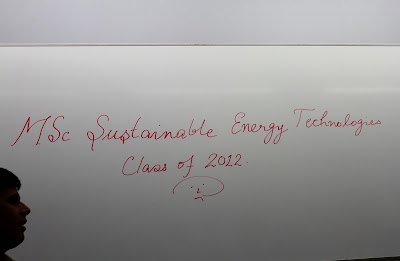Food is a huge part of student life: communal cooking, budget food
shopping, learning recipes and keeping healthy when studying. Food has always
been something that brings people together, and that doesn’t change at
University.
Communal cooking started regularly in my flat in my first year; but it
dwindled as we all developed more separate lives and some were not able to
contribute as much as others. But when we did eat together, we made a thing of
it, and really turned it into a special occasion. We had many roast dinners,
Christmas dinners, pancake nights, chilli con carne nights and pizza delivery
nights throughout my undergraduate experience.
Flat 203’s delicious home-made Christmas Dinner in 2009
Although now I rarely eat a communal dinner with my current flatmate
(we often eat together but have different meals, or sometimes in the confines
of our rooms) food is still an important part of my postgraduate life. For
instance, we have a special ‘Postgrad Coffee & Cake’ morning weekly, which
allows us to bond with our coursemates over food and drink – postgraduate study
is notoriously secluded, and so this is vital in encouraging a sociable
environment and has been very popular so far!
Postgraduate life, due to the intensity of the course, also calls for
encouragement; and my favourite kind of encouragement is the promise of a
delicious meal at the end of my day, a sweet and sugary coffee with friends, or
pudding with a cheeky bit of iPlayer in the evening. Food, as I have discovered
throughout my uni life, makes me happy. And when the going gets tough, I’ll
indulge in comfort food (whilst bearing in mind my health too, of course!).
Budgeting is also a big part of university culinary life.
Undergraduates will budget to keep up with their student loans and grants, and
postgraduates, if unfunded, will budget to keep all their spending to a
minimum, since we don’t get student loans. Deliberating over how to eat the
best meals for the least amount of money takes time and can often lead to
myself wandering the aisles of Sainsbury’s for hours trying to decide which
pasta sauce would be cheapest AND most satisfying.
For many at University, food might also be a problem. It can be
expensive (how can they justify
charging so much for fresh fruit and vegetables!?) and it can be time consuming
(who wants to make a curry from scratch when the takeaway menu is right there
on the table?). You might find yourself getting unhealthier, putting on a
little more weight or losing a little. But as long as you’re sensible and keep
yourself as healthy as you can, food should and could be one of your best
friends at uni.
Here at Southampton you have so many options if you don’t fancy eating
at home. Yes, budgets may not permit this regularly, but as a treat, or instead
of overstocking your fridge, eating on campus (or off) is a sure-fire way of
getting a good meal – especially if you’re not living in catered halls. On
campus you have the brand new and shiny Bridge Bar (one of my favourite haunts
at the moment), the Stag’s Head, Piazza, SUSU Café and Arlott Bar amongst many
more – of course, Humanities students have the Avenue Café.
A few of my personal favourites outside of the University bubble
include Portswood establishments Trago Lounge and Kate’s Café, and further into
town (if I’m celebrating) I’ll indulge in Thai food at Mango, Caribbean cuisine
at Turtle Bay, or something cheaper and just as tasty in West Quay’s food
court.
Tapas at Trago Lounge – delicious!
And finally, there’s the hurdle of learning to cook. I can’t cook. I
struggle to boil an egg (runny egg sandwich anyone?) and have never made my own
pasta or curry sauces – though I have been known to make Jambalaya and a
vegetarian cottage pie from scratch! However I pride myself on making a
different meal every day. Rarely will I have the same meal two days in a row.
Vegetable curry / stir fry anyone?
Personally, I think that enjoying food is a big part of life here in
Southampton, and at University in general – and there’s nothing more comforting
than a chocolate biscuit and a cup of tea in your pyjamas, to calm you down
after a stressful day of studying.
Now, what shall I have for pudding?
Joanne





.JPG)























